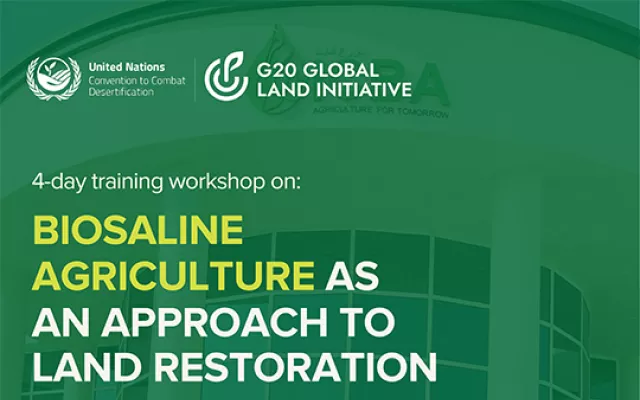ICBA, Pakistan’s regional investment body team up to boost agriculture in northwest
28 May 2018
The International Center for Biosaline Agriculture (ICBA) and the Khyber Pakhtunkhwa (KP) Board of Investment and Trade (KP-BOIT), Pakistan, have joined forces to improve the agricultural sector in northwestern Khyber Pakhtunkhwa Province and work together to strengthen cooperation in areas of common interest.
The cooperation was recently formalized through a memorandum of understanding (MoU) signed by Dr. Ismahane Elouafi, Director General of ICBA, and Mr. Nazir Ahmad Awan, CEO/Secretary of KP-BOIT, in Dubai.
The main purpose of the MoU is to increase cooperation between ICBA and KP-BOIT in the province in areas of common interest, including climate-smart agriculture, crop, soil and water management in salt- affected areas, impact assessment and management of extreme climate events, especially drought, biosaline agroforestry using salt-tolerant trees and grasses, and water-harvesting technologies.
Speaking on the occasion, Dr. Ismahane Elouafi said: “We are delighted to partner with Khyber Pakhtunkhwa Board of Investment and Trade. This collaboration is based on providing technical back-up to KP, as agriculture is an important sector contributing more than 20% of their GDP. We are looking forward to working with KP-BOIT and introducing new crops and new agricultural systems to the population in KP in order to help them increase their incomes as well as their food and nutrition security.”
For his part, Mr. Nazir Ahmad Awan said: “I am deeply impressed to see ICBA. This is an effort to be followed by every underdeveloped country. I hope our visit and partnership with ICBA is likely to become a binding force for all the farmers, agricultural departments and other stakeholders in KP. I am grateful to ICBA’s leadership for giving us the opportunity to visit the center. I am also thankful to Mr. Faisal Saleem Rehman, Vice Chairman of KP-BOIT, and Mr. Nawaz Mehmood Shangla, representative of the KP Government, for making this visit possible.”
Speaking about the partnership, Mr. Nawaz Mehmood Shangla said: “I am thankful to ICBA for this very important collaboration. ICBA has a tremendous experience in the agricultural sector and contributes towards agricultural productivity in several countries. I am hopeful KP will get a lot of benefit from this partnership. Apart from education and health, agriculture is also very important for Pakistan as 25.9% of its gross domestic product (GDP) contribution comes from agriculture. Also, 43% of the country’s labor force is in the agricultural sector. I am looking forward to successfully launching ICBA projects in KP.”
Established in 1999, ICBA is one of the world’s leading organizations in biosalinity research. The center has so far implemented programs in over 30 countries, particularly in the Middle East and North Africa, Central Asia and Caucasus. As an applied agricultural research center, ICBA has been working to address current and future risks and problems to agriculture in marginal areas. The main focus has been to identify, test and pilot resource-efficient, climate-smart crops and technologies in salt-affected, water-scarce and drought-vulnerable regions. As a result, ICBA has accumulated extensive applied experience and developed tailor-made solutions to the problems of salinity, water scarcity and drought.
The center is uniquely positioned to introduce much-needed climate-smart crops and technologies in different parts of the world to alleviate projected food and water crises.











